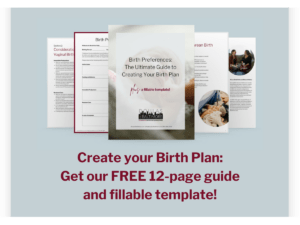We’re talking to you, the one who is pregnant. You are having a ton of new sensations. Your mind doesn’t let you forget that you are pregnant for even a little bit, because, wow, you’re growing a human! Eating seems to have a whole new set of rules. Sleeping is turning into a disaster, and your energy levels may have you wondering why no one told you just how tired you were going to feel ALL. THE. TIME.
However, we’re talking to you, because most likely, you are also the one consumed with looking up information about your coming birth. Maybe you were gifted the one parenting book most birth professionals wishes would go away (What To Expect When You’re Expecting, if you were wondering.) Maybe there was a pamphlet at your provider’s office that talked about childbirth education. Maybe, you read a blog called, “Things To Do Before Your Baby Comes”
Or, maybe you’re terrified, so of course you’re going to find someone who can help you feel more prepared.
Childbirth education classes are sometimes seen as a necessary evil.
Childbirth classes are stereotyped in shows and movies as boring with old videos and booklets with information that is somehow both TMI, and not that helpful in edging out panic as time gets closer to your delivery. Oh, and breathing. Don’t forget to practice breathing!
It’s no wonder that most partners admit that they will go to a class if they have to, but they don’t want really want to go. We are happy to share our childbirth education is more of all the things you want. And less of all the things you don’t.
Our instructors make good use of the time together, so you feel prepared for labor and better connected with your partner at the end of your class. A big part of our focus is on ways to communicate, both before and during labor, and with each other and your medical team. We understand that you and your partner are both having unique experiences that are overwhelming. Our goal is to make sure you are both have the tools to discussion fears, options, and feelings really is an important tool for birth.
We want to encourage you to consider our childbirth education because we cater to families who are busy and value the knowledge our experienced team has curated over the years.
Here are a few specific things about our classes that couples have liked:
- Time frame – options to match their need
- Direct communication with partners with class material specific to their experience
- An easy start to meeting other couples with similar due dates
- Education that is unbiased, with evidence and options being the focus
- Humor – it is a fun class!
- Knowing that if there are questions, Doulas of Baltimore is just a call away
If you are unsure if taking a childbirth class is for you, or if you are looking for reasons to choose an out of hospital childbirth class, take a look at our post speaking directly to that.
We’d love to have you and your partner in class. You have already navigated so many important milestones in your pregnancy. We can help build your, and your partner’s, confidence going into meeting your child!


